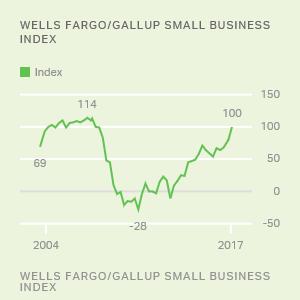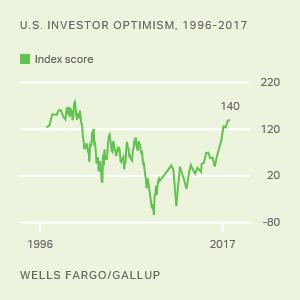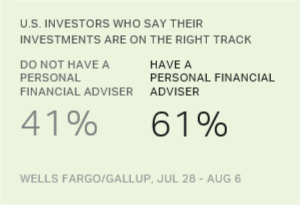Story Highlights
- 74% of investors know little or nothing about social impact funds
- 33% are interested in investing in such funds, including 10% who already do
- 44% of working investors would consider including them in their 401(k) plans
WASHINGTON, D.C. -- Nearly three in four U.S. investors have heard little (34%) or nothing (40%) about the concept of "social impact investing" -- choosing investments based on the social good they will accomplish as well as the financial return they will bring. Only 10% say they have money invested in such funds.
However, 33% say they are at least somewhat interested in investing in them (including those with funds already invested). Interest is slightly higher among female investors (39%), those younger than 50 (39%) and those with annual household incomes of $90,000 or more (38%).
| Very interested | Somewhat interested | Not too interested | Not at all interested | |||||||||||||||||||||||||||||||||||||||||||||||||||||||||||||||||||||||||||||||||||||||||||||||||
|---|---|---|---|---|---|---|---|---|---|---|---|---|---|---|---|---|---|---|---|---|---|---|---|---|---|---|---|---|---|---|---|---|---|---|---|---|---|---|---|---|---|---|---|---|---|---|---|---|---|---|---|---|---|---|---|---|---|---|---|---|---|---|---|---|---|---|---|---|---|---|---|---|---|---|---|---|---|---|---|---|---|---|---|---|---|---|---|---|---|---|---|---|---|---|---|---|---|---|---|---|
| % | % | % | % | |||||||||||||||||||||||||||||||||||||||||||||||||||||||||||||||||||||||||||||||||||||||||||||||||
| All investors | 8 | 25 | 27 | 39 | ||||||||||||||||||||||||||||||||||||||||||||||||||||||||||||||||||||||||||||||||||||||||||||||||
| Age | ||||||||||||||||||||||||||||||||||||||||||||||||||||||||||||||||||||||||||||||||||||||||||||||||||||
| 18 to 49 | 11 | 28 | 33 | 28 | ||||||||||||||||||||||||||||||||||||||||||||||||||||||||||||||||||||||||||||||||||||||||||||||||
| 50 or older | 6 | 23 | 24 | 45 | ||||||||||||||||||||||||||||||||||||||||||||||||||||||||||||||||||||||||||||||||||||||||||||||||
| Gender | ||||||||||||||||||||||||||||||||||||||||||||||||||||||||||||||||||||||||||||||||||||||||||||||||||||
| Men | 4 | 22 | 30 | 42 | ||||||||||||||||||||||||||||||||||||||||||||||||||||||||||||||||||||||||||||||||||||||||||||||||
| Women | 11 | 28 | 24 | 35 | ||||||||||||||||||||||||||||||||||||||||||||||||||||||||||||||||||||||||||||||||||||||||||||||||
| Annual household income | ||||||||||||||||||||||||||||||||||||||||||||||||||||||||||||||||||||||||||||||||||||||||||||||||||||
| Less than $90,000 | 6 | 22 | 27 | 44 | ||||||||||||||||||||||||||||||||||||||||||||||||||||||||||||||||||||||||||||||||||||||||||||||||
| $90,000 or more | 10 | 28 | 27 | 34 | ||||||||||||||||||||||||||||||||||||||||||||||||||||||||||||||||||||||||||||||||||||||||||||||||
| WELLS FARGO/GALLUP INVESTOR AND RETIREMENT OPTIMISM INDEX, NOV. 1-5, 2017 | ||||||||||||||||||||||||||||||||||||||||||||||||||||||||||||||||||||||||||||||||||||||||||||||||||||
The findings are from the latest Wells Fargo/║┌┴¤═° Investor and Retirement Optimism Index poll, conducted Nov. 1-5, 2017. Investors interviewed for the survey are U.S. adults aged 18 and older with at least $10,000 in stocks, bonds or mutual funds.
The Global Impact Investing Network (GIIN) defines the growing field of social impact investing as "investments made into companies, organizations and funds with the intention to generate social and environmental impact alongside a financial return." Solid majorities of investors in the Wells Fargo/║┌┴¤═° poll show interest in following three of these kinds of social impact themes:
-
Forty-four percent are very interested and another 34% are somewhat interested in funds that would protect the environment, "such as fighting climate change and supporting innovations in alternative and renewable energy, pollution and waste management."
-
Forty-one percent are very interested and 35% are somewhat interested in funds that do social good, "such as promoting diversity and inclusion, improving education or protecting human rights."
-
Thirty-seven percent are very interested and 37% are somewhat interested in funds "focusing on responsible corporate governance, including ethics and other behaviors."
Investors younger than age 50 are more likely (52%) than older investors (40%) to be very interested in environmental protection funds, and female investors show more interest in these (51%) than do male investors (37%). Women are also more likely to be very interested in funds doing social good (50%) than are men (32%).
Minority Would Include Social Impact Funds in Their 401(k) Plans
Among nonretired investors with a 401(k) investment plan, 14% say they would definitely include social impact funds in their plan if their company offered them, 30% probably would, 40% probably would not and 11% definitely would not. For companies, there is much more of an upside than a downside with their employees, as about a third (34%) say they would view their company or employer more positively if such funds were made available in their 401(k) plans. Just 6% would view their employer more negatively, while 57% say it wouldn't change their view.
Bottom Line
As of now, the vast majority of U.S. investors know little or nothing about social impact funds, and relatively few have invested in them. But new dynamics in American culture and in the investment world could change that.
In the last two years, Americans have shown record levels of interest in environmental issues. And more U.S. companies are now taking a proactive stance on the issues of diversity and inclusion.
Meanwhile, the field of social impact investments had some momentum in 2017, with announcements of major financial commitments from the Ford Foundation and Swiss bank UBS. A GIIN survey of 209 impact-investing organizations worldwide found the organizations planned to raise the level of investment to $25.9 million last year, up from $22.1 million in 2016.
A growing push from investing organizations for social impact investments in tandem with Americans' growing interest in social and environmental causes may create a surge of interest among U.S. investors in putting their money into sound financial investments that accomplish societal goals they believe in.
Survey Methods
Results for this Wells Fargo/║┌┴¤═° Investor Optimism and Retirement Index poll are based on telephone interviews conducted Nov. 1-5, 2017, on the ║┌┴¤═° U.S. Daily survey, with a random sample of 1,015 adults, aged 18 and older, living in all 50 U.S. states and the District of Columbia having investments of $10,000 or more.
For results based on the total sample of national adults, the margin of sampling error is ┬▒4 percentage points at the 95% confidence level. All reported margins of sampling error include computed design effects for weighting.
Each sample of national adults includes a minimum quota of 70% cellphone respondents and 30% landline respondents, with additional minimum quotas by time zone within region. Landline and cellular telephone numbers are selected using random-digit-dial methods.
Learn more about how the works.





